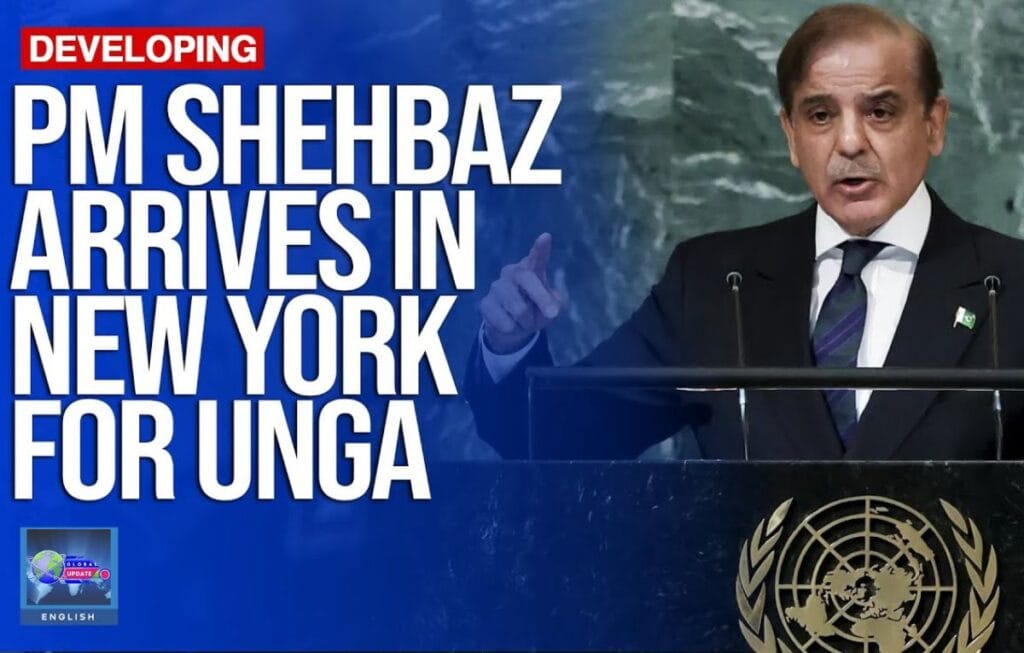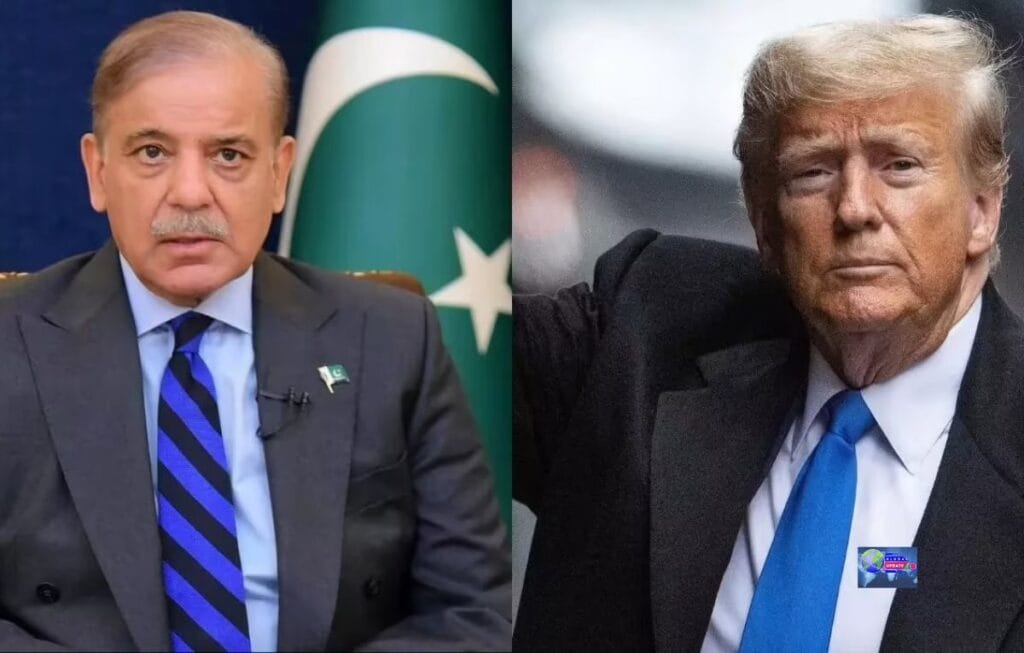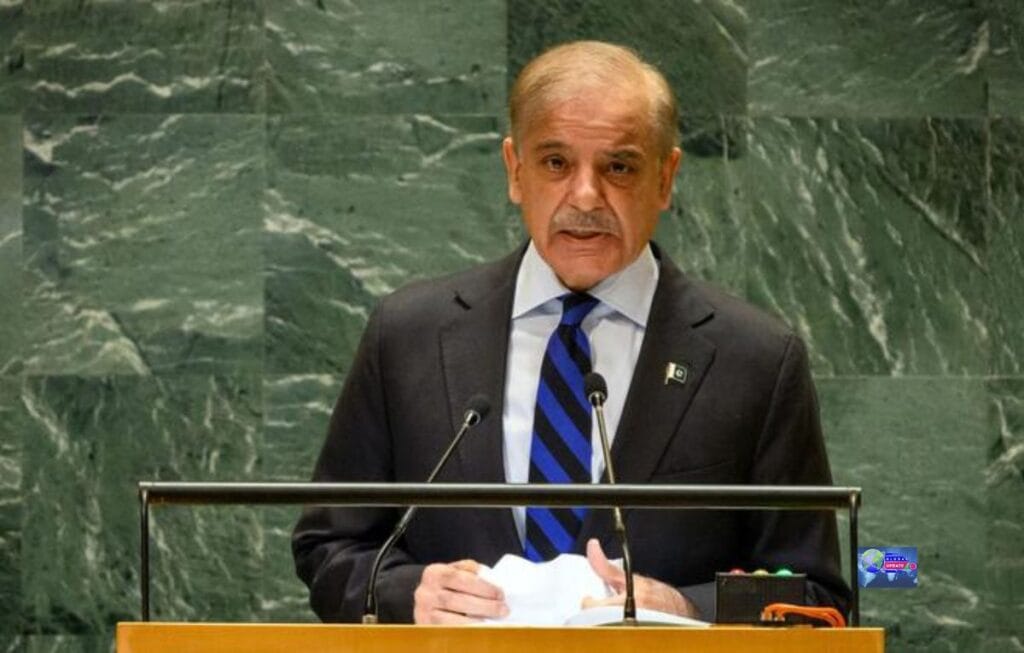During his visit, he is scheduled to address the UNGA session on key issues, including Kashmir, climate change, and regional stability.
In addition to his speech, Shehbaz will engage in several high-level bilateral meetings, including a proposed gathering with U.S. President Donald Trump and a select summit of Muslim leaders.
His trip is viewed as a crucial effort to strengthen Pakistan’s international alliances and address pressing political and humanitarian concerns.
Prime Minister Muhammad Shehbaz Sharif has travelled to the United States to lead Pakistan’s delegation at the 80th session of the United Nations General Assembly (UNGA) in New York (Sept. 22–26, 2025).
The trip includes his address to the UNGA and a series of planned bilateral meetings aimed at advancing Pakistan’s diplomatic priorities: Palestine, Kashmir, climate finance, economic assistance, and regional stability.

Scheduled Meetings & White House Trip
On the sidelines of UNGA, Shehbaz Sharif is scheduled to join a select meeting of Muslim leaders hosted by U.S. President Donald Trump, and will also make a brief trip to Washington for a bilateral meeting with the U.S. president.
Pakistani officials describe the meetings as an opportunity to “reset” and deepen Pakistan–U.S. ties, as well as to discuss urgent regional security and humanitarian issues.
Key Messages Pakistan Will Raise
Pakistan’s official briefing says the prime minister will press the international community on the “prolonged occupation” in Kashmir, urge more support for Palestine, and seek international cooperation on climate change, flood recovery, and economic assistance for developing countries.
The Pakistan Foreign Office emphasised multilateral diplomacy as a core objective of the visit.
Who’s Accompanying the PM
Shehbaz is leading a senior delegation that includes Foreign Minister Ishaq Dar and other ministers and top officials — a lineup meant to support high-level talks on finance, trade, and security during UNGA and bilateral engagements.
Timing & Context — Why Now?
The visit follows Shehbaz’s recent state trip to Saudi Arabia, where Islamabad and Riyadh signed a landmark Strategic Mutual Defence Agreement.
Pakistan’s presence at UNGA and talks in Washington come at a delicate moment in regional geopolitics — with heightened Middle East tensions and evolving Gulf security partnerships — making Pakistan’s diplomatic outreach to the U.S. strategically important.
What Pakistan Hopes to Gain
Officials say Islamabad seeks:
- Political support for Kashmir and Palestine at multilateral forums;
- Economic and development assistance for flood recovery and debt relief;
- Stronger counter-terrorism and security cooperation; and
- Clearer U.S. engagement on Afghanistan and broader regional stability.
Potential Discussion Points with the U.S.
Analysts expect the agenda with U.S. leaders to include counter-terrorism cooperation, Pakistan’s role in regional security (especially after the Saudi pact), civilian-military ties, economic assistance, and Pakistan’s concerns about spillover from regional conflicts.
The presence of Pakistan’s army chief at recent high-level visits has added a security dimension to Islamabad’s diplomacy.
International & Domestic Reactions
Media and diplomats in the region are closely watching: some view the White House meeting as a diplomatic victory for Pakistan.
At the same time, critics warn that Islamabad must strike a balance between its new Gulf ties and its traditional relationships.
Domestic political actors have welcomed the PM’s outreach but will scrutinise concrete deliverables (financial packages, trade deals, or security assurances).
What to Watch Next (Immediate Outputs)
- PM’s UNGA speech (expected to touch on Kashmir, Palestine, climate, and floods).
- Outcome of the select Muslim leaders meeting with President Trump (any joint statement or specific pledges).
- Bilateral readouts following the Washington meeting included joint communiqués, aid/debt-relief announcements, or security cooperation language.
Quick Takeaway
Shehbaz Sharif’s visit to the U.S. is a high-stakes diplomatic push: Islamabad aims to leverage the UNGA to raise core political issues and secure economic and security support.
At the same time, bilateral talks with the U.S. could help recalibrate relations amid shifting regional alliances. The trip’s success will be judged by tangible outcomes — statements, commitments, or new assistance — rather than optics alone.
Here’s an updated article with headings on PM Shehbaz Sharif and Muslim leaders meeting Trump over Gaza, including recent quotes and developments:
Trump Hosts Muslim Leaders, Including PM Shehbaz, to Discuss Gaza Peace
On the sidelines of the 80th UN General Assembly, U.S. President Donald Trump convened a high-level meeting with Muslim and Arab leaders to explore pathways to end the Gaza war.
Among those present was Pakistan’s Prime Minister Shehbaz Sharif, along with officials from Turkey, Jordan, Saudi Arabia, Qatar, Egypt, Indonesia, and the UAE.
“We Are Going to End Something We Did Not Start” — Trump’s Promise
Before formal discussions began, Trump called the meeting “very important,” asserting his optimism that the Gaza war could be ended soon. He said,
“We’re going to end something that we did not start.”
He also told reporters that this particular gathering was more critical than many others held during UNGA, given the stakes in Gaza.
PM Shehbaz Backs Peace Effort, Highlights Pakistan’s Role
Prime Minister Shehbaz Sharif welcomed Trump’s commitment to peace, calling it a sign of global leadership.
He emphasised that Pakistan would continue advocating for the rights of Palestinians and the resolution of the Gaza conflict through diplomacy.
During the meeting, Pakistan reiterated support for humanitarian access, the release of hostages, and an eventual Israeli withdrawal from Gaza.
Key Discussion Topics & Proposals
The meeting addressed several focal points:
- Hostage release frameworks and arranging prisoner-exchange deals.
- Israeli withdrawal strategies from Gaza with security guarantees.
- Post-war governance and reconstruction plans, potentially under multilateral supervision.
- The possibility of sending Muslim troops or peacekeeping contingents to Gaza to facilitate the transition.
However, no formal consensus or joint communiqué was publicly shared immediately after the meeting.

Observations & Significance
- Trump’s framing of the meeting as an ability to end a war not of his making signals a desire to reshape U.S. posture in the Middle East, possibly shifting more burden onto regional actors.
- For Pakistan, participation gives additional diplomatic weight and visibility. Reinforcing its image as a vocal advocate for Muslim causes on global platforms.
- The inclusion of the “Muslim peace bloc” in discussions with Washington highlights efforts to establish a united regional front in shaping Israeli-Palestinian diplomacy.
- Keep on Reading:
- Pakistan as the ‘Net Security Provider’ for the Arabian Peninsula



